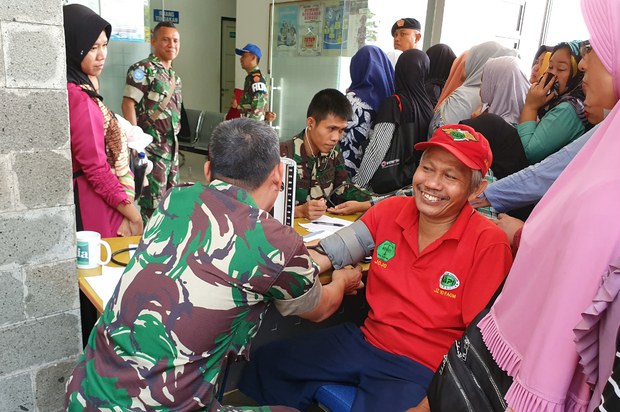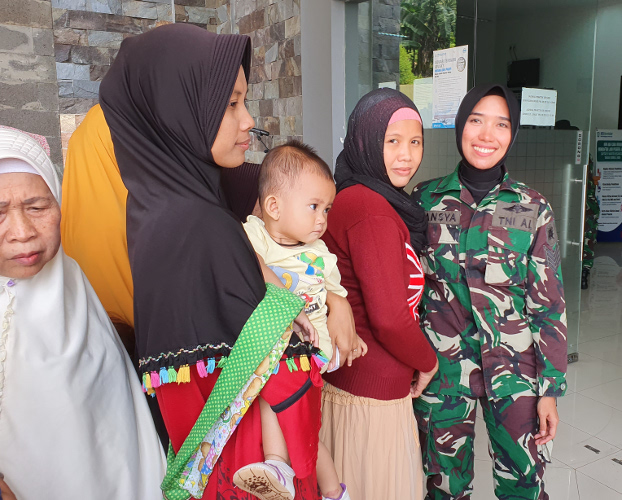Indonesia Pledges Greater Role in U.N. Peacekeeping
2019.08.07
Sentul, Indonesia
 Military personnel treat patients at a clinic at the Indonesian military’s peacekeeping headquarters on the outskirts of Jakarta, Aug. 6, 2019.
Military personnel treat patients at a clinic at the Indonesian military’s peacekeeping headquarters on the outskirts of Jakarta, Aug. 6, 2019.
Indonesia, which took a seat as a non-permanent member of the United Nations Security Council this year, is seeking to boost its U.N. peacekeeping contingent, and add more women to its ranks.
The nation is already the largest contributor in Southeast Asia to U.N. peacekeeping operations, and the seventh largest in the world, with more than 3,000 personnel assigned to eight U.N. missions including in Lebanon, Central African Republic and the Democrat Republic of Congo, according to the government. It has pledged to send another 1,000 troops by the end of 2019.
“We continue to recruit personnel, prepare and enhance the capacity of our personnel because peacekeeping challenges have become more complex by the day and we need to keep up with these challenges,” said Burhanudin, head of international relations for the Indonesian military’s Peacekeeping Mission Center (PMPP).
In addition, the government is working to boost women’s participation in peacekeeping missions, said Burhanudin, who goes by one name.
In 2017, women comprised only 4 percent of soldiers and 10 percent of police officers in U.N. peace operations, according to the U.N.
“The role of women is very important in any peacekeeping mission,” Burhanudin told BenarNews. “For example, many tasks can be done more successfully by involving women, including search operations and health outreach.”
The female approach
On Tuesday, 300 men, women and children lined up for free medical care at a clinic run this week at the Indonesian military’s peacekeeping headquarters on the outskirts of Jakarta. The clinic marked the end of a three-week joint exercise involving Indonesian military personnel and members of the U.S. Army Special Operations Command Pacific.
“The medical civil action program is the final stage in a series of scenarios to prepare peacekeepers to handle infectious disease outbreaks in a U.N. mission area,” said Col. Aldrin Petrus Mongan, deputy commander of the PMPP.
Tansya Susan, a navy sergeant participating in the clinic, told BenarNews that she had found her calling as a peacekeeper.
The 34-year-old is one of 22 Indonesian women who were deployed to Sudan as part of the UNAMID (United Nations-African Union Mission in Darfur).
“Women personnel were extremely needed there as levels of violence against women and malnutrition among children were high,” she said during the medical clinic, adding that people appreciated the female approach to some of their issues.
Tansya, who joined the Indonesian effort in 2017, said she always wanted to be a peacekeeper.
“I feel it’s an honor to represent Indonesia overseas in a peacekeeping mission,” she said. “The local community in Sudan welcomed us warmly and when we were leaving, they said they would miss us.”

10 percent
Women account for about 10 percent of Indonesia’s peacekeeping personnel, Burhanudin said. The government wants to increase women’s representation to 15 percent of military observers and staff officers and 20 percent of police personnel by the end of 2020, but it is facing challenges, including the dearth of women in the armed forces.
“Women personnel are also needed by various military units and if they are married, they need to ask for permission from their husbands,” he said.
In addition, while women are interested in joining the military, many cannot pass the physical training requirements, Burhanudin said.
International security analyst Nicole Jenne said Indonesia needs to push female participation if it wants to be recognized by the U.N. as having a strong role in peace-keeping efforts.
“Nevertheless, there is an important obstacle that is the legal position of the man as head of the household, who has to consent to his wife’s peacekeeping deployment,” she told BenarNews in an email from Chile, where she is a university professor and scholar on Southeast Asia.
“Also, Indonesian society generally believes a mother should not go away on deployment but needs to take care of her kids. Unless these cultural barriers change, it will be very difficult to make big progress and reach the U.N. goal of 25 percent of female peacekeepers,” Jenne said.
Winning hearts and minds
U.N. Under-Secretary General for Peace Operations Jean-Pierre Lacroix has been campaigning for greater involvement by women, leading member states in 2016 to agree to increase their numbers.
In a statement issued late last month, the Indonesian Foreign Ministry said the country was seeking to improve the capability of units needed for peacekeeping purposes, including bomb-disposal, medical and specialized police teams.
“Indonesia is committed to increasing the number and role of Indonesian female peacekeepers, in order to support the achievement of U.N. targets for holding minimum female personnel of 15 percent as military observers and staff officers and 20 percent as police personnel,” the ministry said.
The deployment of female personnel has contributed to winning hearts and minds of local communities, it said.
Indonesian troops have a strong reputation in international peacekeeping, according to Fitri Bintang Timur, an international relations analyst at the Center for Strategic and International Studies in Jakarta. No Indonesian personnel were found to have been involved in cases of sexual violence by U.N. peacekeepers, she said.
But achieving U.N. targets for female participation will be tough “because the percentage of women in the police and the military is at around 5 to 10 percent,” she said.








